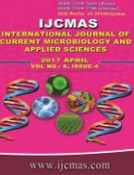


 National Academy of Agricultural Sciences (NAAS)
National Academy of Agricultural Sciences (NAAS)

|
PRINT ISSN : 2319-7692
Online ISSN : 2319-7706 Issues : 12 per year Publisher : Excellent Publishers Email : editorijcmas@gmail.com / submit@ijcmas.com Editor-in-chief: Dr.M.Prakash Index Copernicus ICV 2018: 95.39 NAAS RATING 2020: 5.38 |
Neonatal septicemia is a clinically diagnosed condition having diverse etiology and changing antibiotic sensitivity pattern. The knowledge of common bacterial agents causing septicemia and their antibiogram is useful in deciding empirical antimicrobial therapy. The neonatal blood cultures were studied to know the bacterial species and their antibiotic sensitivity pattern. Aim of the study is to evaluate sensitivity pattern of bacterial isolates causing neonatal septicemia and to know clinical outcome of the cases. Automated blood cultures of 250 neonates, clinically diagnosed to have septicemia were performed using BacT/ALERT 3D (BioMerieux). Bottles flagging positive were processed for identification and antibiotic susceptibility tests by Kirby Bauer disc diffusion method. Of the 250 cases studied, blood culture was positive in 117 (46.8%). Gram positive organisms were predominant (42.2%), followed by Gram negative organisms (29.7%). CoNS, Klebsiella pneumoniae, Acinetobacter spp., Escherichia coli were commonest organisms isolated accounting for 29.7%, 10.2%, 6.2% and 5.4% of cases respectively. All gram positive isolates were susceptible to vancomycin and linezolid. Most of gram negative isolates were susceptible to imipenem. Mortality rate was 10.4% with 65.4% blood culture positivity. Blood culture helps in rapid and early diagnosis of neonatal sepsis with early shift from empirical therapy to definitive treatment.
 |
 |
 |
 |
 |